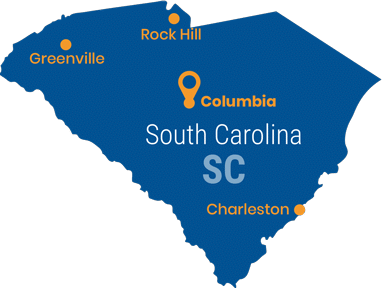What Career Options are Available for Finance Majors?
Academic degree programs in finance and related subjects are available at colleges and universities in South Carolina and throughout the entire United States. This major may be particularly appealing to individuals interested in and skilled with numbers. Graduates from these programs can anticipate a wide array of employment opportunities, especially as the knowledge and skills acquired are highly useful and easily transferable across multiple fields. Qualified finance professionals can generally find employment with companies and organizations in almost every industry, with ample job opportunities in areas related to money management, banking, and economics.
Read MoreAccording to the US Bureau of Labor Statistics (BLS), employment for business and financial occupations is expected to grow faster than is average for all occupation in the nation from 2022 to 2032. This will result in approximately 911,400 job openings each year. Notably, some finance professions are projected to grow more than others. Market research analysts, for example, can expect to see employment increase by 13% during the same time.
Finance and insurance is the ninth largest industry in South Carolina, accounting for $11 billion in revenue each year. It may be possible for graduates to obtain employment in many of the state’s other top sectors as well, including manufacturing, real estate, business services, education, healthcare, retail, wholesale, construction, entertainment, and information.
Based on data provided by the BLS, 101,200 business and financial operations professionals were employed in South Carolina as of May 2022. The annual mean wage for these occupations was $73,790, which is much higher than the state’s annual mean wage of $50,650 for all occupations.
Because finance is a fairly popular major area of study, degree programs in this field are widely available at academic institutions nationwide. Students can generally choose traditional in-person or online enrollment. While remote learning options provide the convenience of taking classes from anywhere with internet access, as well as greater flexibility in class scheduling and course completion, it’s not always optimal. Individuals planning to work in South Carolina, for example, are likely to find it advantageous to select programs offered by in-state schools. This choice guarantees a geographically relevant education, which can be a crucial factor when pursuing jobs with local employers and/or state certifications and licenses.
Students interested in completing degrees in this field will have plenty of options for finance in South Carolina and in nearby states. These options may include South Carolina schools such as the Darla Moore School of Business in the University of South Carolina, Coastal Carolina University, Francis Marion University, Charleston Southern University, College of Charleston, Wofford College, Anderson University, Clemson University, and a variety of other schools in South Carolina.
Notably, there are many different occupations related to and involving finance, each with distinct standards and expectations. Money management and investment are integral aspects of running successful businesses, both small and large. As a result, employers in every industry are often eager to hire experienced professionals in this field.
While hiring standards and professional duties can differ significantly from job to job, most finance professionals provide some sort of monetary assistance to individuals, companies, and organizations. This most frequently involves providing assistance with budgeting, financial planning, or forecasting. In fact, these professionals are commonly tasked with developing financial plans, strategies, and/or forecasts based on market trends, economic indicators, and financial data. The resulting information is often highly valuable to stakeholders when making decisions and establishing goals.
Risk management is another critical responsibility for finance professionals. By evaluating and mitigating monetary risks, they help ensure the financial stability for businesses and individuals alike. It is also common for them to oversee regulatory compliance with state and federal finance laws, ensuring adherence to relevant standards and regulations.

Featured Online Programs
Top Ranked Campus & Online Finance Programs in South Carolina
Clemson University
Score: 89.71
- Undergraduate Tuition
- In-State: $15,554
- Out-of-State:$39,498
- Net Price: $24,408
- Acceptance Rate: 38%
- Retention Rate: 93%
- Graduation Rate: 88%
- Total Enrollment: 28,747
- Undergrad Students: 22,875
- Graduate Students: 5,872
- Grads Salary: $76,000
- Student-to-faculty: 16:1
Citadel Military College of South Carolina
Score: 83.24
- Undergraduate Tuition
- In-State: $12,570
- Out-of-State:$37,370
- Net Price: $21,041
- Acceptance Rate: 98%
- Retention Rate: 88%
- Graduation Rate: 73%
- Total Enrollment: 3,727
- Undergrad Students: 2,661
- Graduate Students: 1,066
- Grads Salary: $76,000
- Student-to-faculty: 11:1
University of South Carolina-Columbia
Score: 80.69
- Undergraduate Tuition
- In-State: $12,688
- Out-of-State:$34,934
- Net Price: $26,068
- Acceptance Rate: 61%
- Retention Rate: 91%
- Graduation Rate: 78%
- Total Enrollment: 36,579
- Undergrad Students: 28,470
- Graduate Students: 8,109
- Grads Salary: $71,000
- Student-to-faculty: 18:1
College of Charleston
Score: 79.12
- Undergraduate Tuition
- In-State: $12,978
- Out-of-State:$36,858
- Net Price: $20,806
- Acceptance Rate: 72%
- Retention Rate: 82%
- Graduation Rate: 65%
- Total Enrollment: 11,729
- Undergrad Students: 10,660
- Graduate Students: 1,069
- Grads Salary: $71,000
- Student-to-faculty: 16:1
Furman University
Score: 78.96
- Undergraduate Tuition
- In-State: $58,312
- Out-of-State:$58,312
- Net Price: $32,901
- Acceptance Rate: 53%
- Retention Rate: 91%
- Graduation Rate: 81%
- Total Enrollment: 2,505
- Undergrad Students: 2,327
- Graduate Students: 178
- Grads Salary: $71,000
- Student-to-faculty: 9:1
Bob Jones University
Score: 78.86
- Undergraduate Tuition
- In-State: $23,400
- Out-of-State:$23,400
- Net Price: $19,773
- Acceptance Rate: 100%
- Retention Rate: 81%
- Graduation Rate: 70%
- Total Enrollment: 2,893
- Undergrad Students: 2,477
- Graduate Students: 416
- Grads Salary: $70,000
- Student-to-faculty: 13:1
Wofford College
Score: 76.51
- Undergraduate Tuition
- In-State: $54,100
- Out-of-State:$54,100
- Net Price: $31,061
- Acceptance Rate: 59%
- Retention Rate: 90%
- Graduation Rate: 81%
- Total Enrollment: 1,873
- Undergrad Students: 1,873
- Graduate Students: N/A
- Grads Salary: $66,000
- Student-to-faculty: 12:1
Francis Marion University
Score: 74.8
- Undergraduate Tuition
- In-State: $11,160
- Out-of-State:$21,544
- Net Price: $11,231
- Acceptance Rate: 82%
- Retention Rate: 69%
- Graduation Rate: 43%
- Total Enrollment: 4,017
- Undergrad Students: 3,623
- Graduate Students: 394
- Grads Salary: $65,000
- Student-to-faculty: 12:1
Southern Wesleyan University
Score: 74.01
- Undergraduate Tuition
- In-State: $27,870
- Out-of-State:$27,870
- Net Price: $20,336
- Acceptance Rate: 100%
- Retention Rate: 66%
- Graduation Rate: 52%
- Total Enrollment: 1,188
- Undergrad Students: 887
- Graduate Students: 301
- Grads Salary: $74,000
- Student-to-faculty: 12:1
Coastal Carolina University
Score: 73.51
- Undergraduate Tuition
- In-State: $11,640
- Out-of-State:$29,628
- Net Price: $14,453
- Acceptance Rate: 80%
- Retention Rate: 76%
- Graduation Rate: 51%
- Total Enrollment: 10,829
- Undergrad Students: 10,306
- Graduate Students: 523
- Grads Salary: $62,000
- Student-to-faculty: 16:1
University of South Carolina-Upstate
Score: 71.63
- Undergraduate Tuition
- In-State: $11,583
- Out-of-State:$22,545
- Net Price: $13,794
- Acceptance Rate: 70%
- Retention Rate: 69%
- Graduation Rate: 42%
- Total Enrollment: 4,946
- Undergrad Students: 4,471
- Graduate Students: 475
- Grads Salary: $62,000
- Student-to-faculty: 15:1
Claflin University
Score: 68.06
- Undergraduate Tuition
- In-State: $17,046
- Out-of-State:$17,046
- Net Price: $21,232
- Acceptance Rate: 73%
- Retention Rate: 79%
- Graduation Rate: 49%
- Total Enrollment: 1,835
- Undergrad Students: 1,754
- Graduate Students: 81
- Grads Salary: $59,000
- Student-to-faculty: 13:1
Newberry College
Score: 64.49
- Undergraduate Tuition
- In-State: $30,050
- Out-of-State:$30,050
- Net Price: $20,941
- Acceptance Rate: 75%
- Retention Rate: 70%
- Graduation Rate: 44%
- Total Enrollment: 1,507
- Undergrad Students: 1,462
- Graduate Students: 45
- Grads Salary: $57,000
- Student-to-faculty: 14:1
Benedict College
Score: 63.15
- Undergraduate Tuition
- In-State: $18,000
- Out-of-State:$18,000
- Net Price: $18,146
- Acceptance Rate: 67%
- Retention Rate: 65%
- Graduation Rate: 21%
- Total Enrollment: 1,731
- Undergrad Students: 1,694
- Graduate Students: 37
- Grads Salary: $63,000
- Student-to-faculty: 14:1
Voorhees University
Score: 57.43
- Undergraduate Tuition
- In-State: $12,630
- Out-of-State:$12,630
- Net Price: $15,747
- Acceptance Rate: 100%
- Retention Rate: 63%
- Graduation Rate: 38%
- Total Enrollment: 515
- Undergrad Students: 460
- Graduate Students: 55
- Grads Salary: $44,000
- Student-to-faculty: 10:1
Online Finance Education in South Carolina
Prospective finance students will likely find various higher education programs that offer finance degrees in South Carolina and throughout the United States. This popular area of study is available at the associate, bachelor's, master's, and doctoral levels, with some institutions offering professional certificate programs. While these certificates take less time, they may not carry the same academic weight as traditional degrees.
According to the US Bureau of Labor Statistics, most business and finance occupations require professionals to hold bachelor's degrees. While it’s possible to find employment with less education, such opportunities are limited. Individuals with advanced degrees often enjoy better job prospects and pay potential, and master's or doctoral degrees are typically necessary for positions in financial management.
Online Associates (AS)

An associate degree in finance generally consist of 60 credit hours of coursework that take full-time students approximately two years to complete. Each undergraduate curriculum is unique, typically blending general liberal arts with major-specific classes. This approach ensures students explore communication, mathematics, and social science topics alongside content relevant to their area of study, which fosters a well-rounded educational foundation for future learning and professional employment. Finance students usually receive a broad introduction to the field that includes studying relevant areas such as finance, accounting, and bookkeeping. Those enrolled are also likely to learn about business, payroll, software, and banking.
This degree commonly prepares graduates for employment as accounting clerks, billing specialists, and bookkeepers. Entry-level employment may also be available in other industries, as companies of all kinds often rely on professionals capable of spreadsheet management, budgeting, tax preparation, and financial data analysis. Given that many employers prefer candidates with bachelor’s degrees, however, a significant number of graduates choose to further their education.
Credits from undergraduate courses can be transferred and used to fulfill requirements for new undergraduate degree programs, such as those at the baccalaureate level. Generally, colleges and universities acknowledge up to 60 or 90 hours of prior coursework. This is equivalent to about two years of study. Consequently, individuals holding associate degrees may require only an additional two years of education to obtain bachelor’s degrees.
Online Bachelors (BS)

Bachelor’s degrees in finance often consist of 120 credit hours of coursework that take full-time students approximately four years to complete. As previously mentioned, undergraduate programs such as these typically incorporate both general liberal arts and major-specific classes in their curriculums. This ongoing study of various subjects including communication, mathematics, and social sciences - ensures that students receive a comprehensive education applicable to diverse aspects of life, as well as any potential further academic endeavors. Those majoring in finance can also expect to receive a broad introduction to the most important subjects in the field. This usually includes financial planning, forecasting, investing, financial statement evaluation, cash flows, and security markets. Instruction is also common in accounting principles, financial institutions and markets, investments, and risk management.
Additionally, finance majors are often encouraged by many colleges and universities to choose concentrations or specialized areas of study. Choosing to pursue additional instruction in a specific sub-field can help students prepare for particular types of employment upon graduation.
Concentrations that may be available include:
- Investment Management
- Banking and Financial Services
- Corporate Finance
- Risk Management and Insurance
- Real Estate
This degree type commonly readies graduates for employment as financial planners, accountants, and financial analysts. It may also be possible to find work in other industries. As an alternative, graduates can also choose to pursue advanced education in the field. Completing graduate school can lead to greater employment options and higher pay potential. Individuals who intend to apply for master’s degree programs must be ready to submit official undergraduate transcripts to prospective colleges and universities. Additionally, applicants are usually required to meet specified minimum grade point average (GPA) and Graduate Record Examinations (GRE) score criteria.
Online Masters (MS or M.Fin.)

Master’s degrees in finance generally range from 30 to 36 credit hours of coursework that take full-time students approximately two years to complete. Alternatively, some colleges and universities offer accelerated programs. These may require as little as 18 months to finish.
Graduate-level programs no longer include general liberal arts classes. However, many programs do require applicants to successfully complete specified undergraduate courses, or prerequisites, before admission. This ensures that all incoming students have the fundamental knowledge and skills necessary for advanced study in the field.
Curriculums vary but are typically designed to help students prepare for advanced employment opportunities in the field. While course requirements vary, enrolled individuals frequently receive in-depth instruction in business communications, financial accounting, derivatives and risk management, financial modeling and firm valuation, and international financial management.
Similar to bachelor’s degrees, it’s also common for colleges and universities to offer concentrations or specialized areas of study.
Common options include:
- Real Estate Finance
- Computational Finance and Trading Systems
- Derivatives and Risk Management
- Finance and Economics
Upon graduation, individuals often become eligible for positions such as financial analysts, financial examiners, financial managers, and personal finance advisors. With superior finance knowledge and skills, graduates generally gain access to some of the most in-demand jobs available in the field.
Online Doctorate (PhD)
A PhD or doctorate in finance generally consists of between 60 and 120 credit hours that take full-time students four to seven years to complete. As terminal degrees, these programs uphold rigorous academic standards. Programs at this level may also be structured quite differently and, in some cases, students are even given opportunities to provide input on what coursework should be included. It’s not uncommon for those enrolled to work alongside professors to develop unique curriculums designed to help them achieve specific employment outcomes.
In some cases, the option to select concentration areas is still available.
Common examples of possible specialty areas of study at this level include:
- Forensic Accounting
- Accounting Information Systems
- Audit Accounting
- Public Accounting
- Managerial Accounting
While curriculums vary by institution, they typically offer opportunities to study various advanced topics accounting research, advanced statistics, microeconomic theory, and corporate governance. Students typically undergo traditional classroom instruction during the first phase of enrollment, with later years dedicated to independent study and research. In many cases, these degrees conclude with the creation, presentation, and defense of dissertations before a board of computer information technology professors.
While relatively few finance professions exclusively demand that candidates possess doctoral degrees, graduates do become eligible for some of the most lucrative employment opportunities available. Opportunities may include positions in corporate management, as well as higher education and/or research.
Get our Financial Aid Guide Learn more about finance resources and scholarshipsBecome a Finance Professional in South Carolina
The field of finance is extensive, offering numerous job opportunities at different professional levels. To navigate this wide array of options more effectively, you should start by identifying your specific interests and goals. Once you have pinpointed your preferred finance profession, it will become considerably easier to chart a clear and focused path to success.
When contemplating your long-term career objectives, it’s crucial to acknowledge the distinctiveness of each occupation. Although some may share similarities, the requirements in terms of education, training, and experience often differ. At times, these distinctions can be substantial. Acquainting yourself with the standards and expectations of your desired occupation is vital. This not only aids in selecting the most fitting degree level and major area of study, but also influences your choices regarding elective courses, academic minors, departmental concentrations, extracurricular activities, and potential internship opportunities.
After acquiring the essential degree(s), you have the option to seek professional certification or licensure. For some occupations, this may even be obligatory. Although not a universal requirement, obtaining certification can be highly advantageous. It not only showcases proficiency in the field but also underscores your capability to deliver specific services. Employers also often favor candidates with these additional credentials.
There are many relevant certifications available.
Some of the most popular options for financial professionals include:
- Certified Financial Planner (CFP)
- Chartered Financial Analyst (CFA)
- Certified Management Accountant (CMA)
- Certified Fund Specialist (CFS)
- Chartered Financial Consultant (ChFC)
- Chartered Investment Counselor (CIC)
- Certified Investment Management Analyst (CIMA)
- Chartered Market Technician (CMT)
- Certified Public Accountant (CPA)
- Personal Finance Specialist (PFS)
- Chartered Life Underwriter (CLU)
- Certified Government Financial Manager (CGFM)
- Certified Healthcare Financial Professional (CHFP)
- Certified International Investment Analyst (CIIA)
- Certified Merger and Acquisition Advisor (CM&AA)
- Chartered Economic Analyst (ChEA)
- Financial Risk Manager (FRM)
A particularly common pursuit is licensure as a Certified Public Accountant (CPA). This is the premier credential for individuals pursuing public accounting careers. In South Carolina, the CPA licensing process is overseen by the South Carolina Board of Accountancy. The Board also regulates credentialing for public accountants and accounting practitioners.
In order to apply for a CPA license in South Carolina, you will need to meet a variety of requirements. First, you must possess at least a baccalaureate degree consisting of 120 semester hours. These must include at least 24 semester hours of accounting in courses which cover financial accounting, managerial accounting, taxation, and auditing. Additionally, 24 semester hours must be in business-related topics including macro- and microeconomics, finance business law, management, computer science, marketing, and accounting.
CPA candidates must also pass all sections of the Uniform CPA Examination, which is overseen by the National Association of State Boards of Accountancy (NASBA).
The test consists of four, four-hour sections:
- Auditing and Attestation (AUD)
- Business Environment and Concepts (BEC)
- Financial Accounting and Reporting (FAR)
- Regulation (REG)
In addition to education and testing requirements, those applying to become CPAs in South Carolina also need a minimum of one year full-time, professional experience in the field. This may be achieved by serving under the direct supervision and review of a current CPA or by teaching accounting at the college or university level for five years.
Potential Careers for Finance Graduates in South Carolina
Accountant
Accountants examine, prepare, and maintain financial records for individuals, companies, and organizations - often contributing to the financial well-being and integrity of their employers. They are responsible for ensuring accuracy and compliance with relevant laws and regulations, as well as analyzing financial data, creating reports, and providing insights that can aid in decision-making. They may also specialize in various financial areas, such as auditing, tax preparation, and consulting. According to the Bureau of Labor Statistics (BLS)s, accountants make an average base salary of $79,880 per year.
Budget Analyst
Budget analysts are financial professionals responsible for developing, reviewing, and managing budgetary plans for companies and organizations. In addition to analyzing financial data and expenditures to ensure that budgets align with organizational goals and regulations, they often collaborate with various departments to gather information and make recommendations for efficient resource allocation. They play a key role in helping businesses make informed financial decisions by providing insights into spending patterns and financial performance. According to the Bureau of Labor Statistics (BLS), budget analysts make an average base salary of $84,940 per year.
Certified Public Accountant (CPA)
CPAs are financial professionals who examine and prepare financial records, ensuring accuracy in financial reporting and compliance with laws and regulations. Primarily, these are responsible for handling accounting, tax, reporting, and/or auditing process for individuals, companies, and government organizations. Additional tasks include staying up to date on regulations, performing audits, and making suggestions to improve bookkeeping. They play a crucial role in helping individuals, companies, and organizations maintain financial integrity and make informed decisions. According to BLS, certified public accountants make an average base salary of $119,000 per year.
Financial Advisor
Financial advisors provide guidance to clients on matters related to investments, insurance, and financial planning. After assessing financial situations and reviewing client goals, they work to develop strategies to achieve established financial objectives. Their work commonly pertains to retirement planning and/or wealth accumulation. These professionals also spend a significant amount of time staying informed about market trends, investment options, and regulatory changes in order to provide the most accurate and timely advice. Another common responsibility is assisting clients in understanding complex financial concepts and how they relate to individual circumstances in order to make the most informed decisions possible. According to BLS, financial advisors make an average base salary of $99,580 per year.
Insurance Agent
Insurance agents act as intermediaries between insurance companies and clients, offering suitable insurance products, and explaining policy details. They spend much of their time guiding individuals and companies in selecting coverage plans that align with specified requirements. They also contribute to risk management by ensuring clients are adequately protected against potential financial losses and they may build relationships with policyholders to foster a sense of financial security, as well as facilitating claims processes and providing ongoing support. According to BLS, insurance agents make an average base salary of $59,080 per year.
Investment Banker
Investment bankers are integral to the financial industry, facilitating complex financial transactions and managing capital for organizations, the government, and other entities. In addition to providing strategic financial advice and executing transactions, they navigate intricate financial markets, assess risks, and develop innovative financial solutions. They often work closely with their clients and specialize in a wide variety of finance activities including mergers, acquisitions, and underwriting securities. According to BLS, investment bankers make an average base salary of $76,900 per year.
Loan Officer
Loan officers work in the financial sector - assisting individuals and organizations in securing loans needed to achieve their various financial goals. They often guide clients through the loan process, explaining terms and conditions, evaluating loan applications, analyzing financial information, and assessing creditworthiness. Working closely with borrowers, the help determine the most suitable loan options while fostering financial growth and ensuring compliance with lending regulations. According to BLS, loan officers make an average base salary of $69,990 per year.
Tax Preparer
Tax preparers play a vital role in assisting individuals and businesses in accurately filing their tax returns. They spend the majority of their time gathering financial information from clients, reviewing records, and preparing tax documents. Specializing in tax codes and regulations, these professionals are also responsible for staying updated on tax law changes in order to provide accurate advice, minimize tax liabilities, ensure compliance, and maximizing eligible deductions. According to BLS, tax preparers make an average base salary of $58,160 per year.
Sources:
- Accountants and Auditors. U.S. Bureau of Labor Statistics
- Business and Financial Occupations. U.S. Bureau of Labor Statistics
- Employment of market research analysts and marketing specialists, by state, U.S. Bureau of Labor Statistics
- Finance Certifications. Financial Management Association (FMA)
- South Carolina Board of Accountancy. Labor Licensing Regulation (LLR)
- Requirement to sit for the CPA Exam. South Carolina Board of Accountancy
- Applying for the Uniform CPA Examination: South Carolina. National Association of State Boards of Accountancy (NASBA)
Search All Programs
















